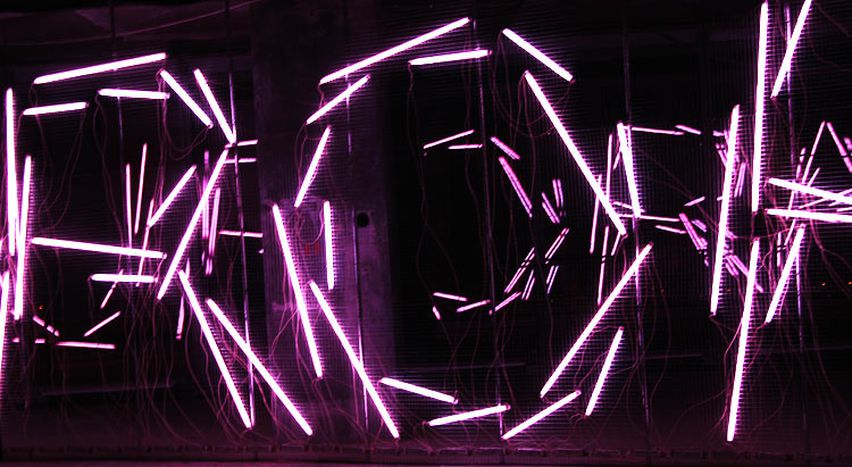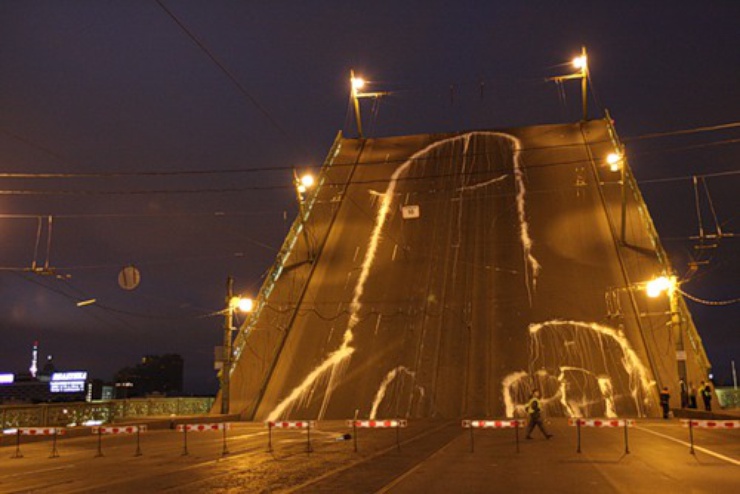
Russian art group Voina boycotts Moscow contemporary art biennale
Published on
It's not the country that you'd expect to celebrate activist art. Held until 20 October, Moscow's fourth contemporary art biennale is not exactly a step towards the freedom of expression, especially since the famous Russian protest collective are paradoxically protesting against the biennale’s 'international festival of activist art'
Once upon a time in 2005, Russia practically brought contemporary art onto the Red Square. In an ironic twist reuniting contemporary art with the former soviet regime which had once repressed it, the first ever Moscow biennale of contemporary art was held next to the Kremlin in the former Lenin museum. Founded in 2003, it has been held in 2005, 2007 and 2009 so far. Eight years on, the Moscow biennale has grown up. The fourth edition opened on 23 September and will showcase international stars of the contemporary art scene until 30 October. However, the biennale continues to combine an official profile - for example, one media partner is state-controlled TV channel Russia 24 - with a celebration of critical, questioning contemporary art. The latter is something the Russian authorities normally aren’t always so happy to support.
Ai WeiWei: VIP in Russia
This mixture can spawn some odd situations. The Alice-in-Wonderland style paradoxes of the 2011 biennale could almost be the creations of a badly written farce. After all, who would have expected Ai Weiwei, a vocal critic of corruption in neighbouring China, to be a VIP guest in the city where Mikhail Khodorkovsky (oil magnate and Putin critic) remains in prison? Holding any event like the biennale in Moscow will always provoke sticky political questions. Organisers may have hoped that Ai Weiwei’s participation would draw attention away from questions of political integrity. If so, they weren’t prepared for rebellion in the ranks prompted by Russian born and bred guerilla art movement Voina.

Since the birth of the group in 2006, Voina (meaning 'war' in Russian) has grabbed the attention of the national government and international press with well-timed stunts such as the Saint Petersburg bridge affair, when they adorned a drawbridge with an illuminated phallus. Works by Voina are as unexpected as those of Ai Weiwei at an event sponsored by the Russian culture ministry: key members of the group, Oleg Vorotnikov and Leonid Nikolaev, were arrested by Russian authorities in November 2010. They remain under police surveillance. Nevertheless, the group is featured in a special exhibition held as part of the biennale entitled ‘Media impact: international festival of activist art’.
Protest artists protest against protest art festival
Curious, you might think – but as Alice would say, it gets curiouser still. Voina have added another twist to the plot in announcing a boycott of the biennale. They claim to have been included in the art festival against their will, declaring that some of the works displayed under their name are fake, while others were stolen from them by - wait for it - the Russian police when they were arrested last autumn. A statement on the group’s website accuses the biennale organisers of aiming ‘to discredit the opposition and protest art’ and seeking ‘to maintain a facade of art life in Russia before the international community’.
Voina claim to have been included in the art festival against their will
The assertion is not all too different from the comments of other Russian critics. American duo The Yes Men have joined Voina in the boycott, causing the Russian collective’s action to resound across the Atlantic. Meanwhile, the allegedly fake object on display at the biennale is a video of (female) activists kissing Russian policewomen in the Moscow metro. The video was released in February 2011 by former Voina activists after their expulsion from the group. The embraces are sudden, sometimes tender, sometimes brutal. The reactions of the police officers range from bafflement to rage, a symbol of the tense relationship between activist art and Russian authorities.
Images: main (cc) Alles Photos/ Flickr in text, bridge © Trenirofki/ Yandex



